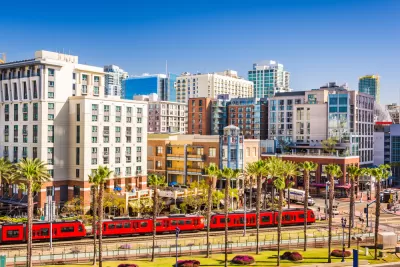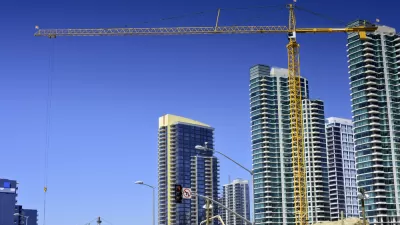One of the more pro-development mayors in the country won't approve an ordinance that would expand the reach of affordable housing requirements for new development.

"Mayor Kevin Faulconer said Tuesday he will veto new city regulations focused on requiring housing developers to build more low-income units, siding with the local business community over labor leaders and other supporters of the new policy," reports David Garrick.
The San Diego City Council narrowly approved an inclusionary zoning ordinance this week, by a vote of 5-4. An additional vote is necessary to override a mayoral veto.
Mayor Faulconer based the decision to veto the ordinance while siding with "economists and builders" that oppose the policy on the grounds that "will have the unintended consequence of leading to less affordable housing, not more," as explained in the words of an email from Faulconer spokesman Gustavo Portela, as cited by Garrick.
As for the details of the ordinance approved by the City Council, Garrick explains the ordinance in context of the city's existing policies:
The proposed law would require developers to reserve 10 percent of units in every project for people making 50 percent of the region’s median income or less, but the law would provide multiple alternative ways to comply with that requirement.
The city’s existing policy requires developers to make 10 percent of the units in a housing project affordable to families making 65 percent of the median income, so the proposal would drop that to 50 percent.
San Diego has been busy in 2019, approving and considering regulations intended to spur development in the city, including parking requirement reform and a new density bonus for affordable housing development. Mayor Faulconer has also called for new building heights in transit-adjacent development.
FULL STORY: San Diego mayor vetoing controversial proposal to require developers to build more low-income housing

Alabama: Trump Terminates Settlements for Black Communities Harmed By Raw Sewage
Trump deemed the landmark civil rights agreement “illegal DEI and environmental justice policy.”

Study: Maui’s Plan to Convert Vacation Rentals to Long-Term Housing Could Cause Nearly $1 Billion Economic Loss
The plan would reduce visitor accommodation by 25% resulting in 1,900 jobs lost.

Planetizen Federal Action Tracker
A weekly monitor of how Trump’s orders and actions are impacting planners and planning in America.

Wind Energy on the Rise Despite Federal Policy Reversal
The Trump administration is revoking federal support for renewable energy, but demand for new projects continues unabated.

Passengers Flock to Caltrain After Electrification
The new electric trains are running faster and more reliably, leading to strong ridership growth on the Bay Area rail system.

Texas Churches Rally Behind ‘Yes in God’s Back Yard’ Legislation
Religious leaders want the state to reduce zoning regulations to streamline leasing church-owned land to housing developers.
Urban Design for Planners 1: Software Tools
This six-course series explores essential urban design concepts using open source software and equips planners with the tools they need to participate fully in the urban design process.
Planning for Universal Design
Learn the tools for implementing Universal Design in planning regulations.
Caltrans
Smith Gee Studio
Institute for Housing and Urban Development Studies (IHS)
City of Grandview
Harvard GSD Executive Education
Toledo-Lucas County Plan Commissions
Salt Lake City
NYU Wagner Graduate School of Public Service




























